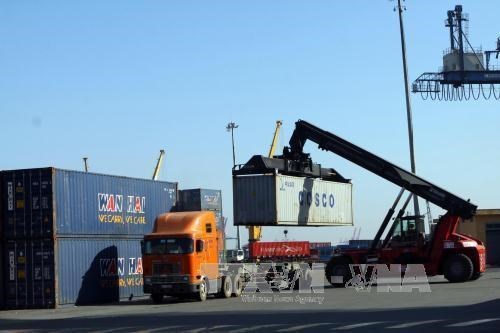According to Do Viet Phuong, Head of the Vietnamese Commercial Affairs Office in Cuba, many Vietnamese enterprises have sought trade and investment cooperation opportunities in Cuba in recent years, especially in the domains of tourism, health care, construction, consumer goods, electronics, aquaculture and real estate.
    |
 |
|
In 2017, two-way trade between Vietnam and Cuba reached USD 224.3 million. Photo for illustration |
Notably, a Vietnamese Government-supported rice production project helped Cuba increase its rice yield to 4.4 tons/ha from 2.4 tons/ha in previous time, meeting about 50 percent of the domestic demand. The rice cultivation area was also expanded from 137,000 ha to 200,000 ha.
More importantly, the project has helped Cuban farmers acquire and master paddy growing techniques. The Vietnamese side will support Cuba in the fifth period of the project.
A number of cooperation project between the two sides are on the progress, including those in real estate, consumer goods and beverage production, and pottery and ceramics.
Phuong, however, noted that Vietnam’s investors are still facing many difficulties as the foreign currency liquidity of the Cuban banks is still slow, and legal procedures related to business registration are complicated.
The Vietnamese Government should simplify policies on capital to make it easier for enterprises to improve their competitiveness in the Cuban market, he said, adding that it is necessary to organize events to provide more information related the Cuban market to Vietnamese businesses.
In 2017, two-way trade between Vietnam and Cuba reached USD 224.3 million, of which Vietnam’s exports to Cuba valued at USD 217 million and its imports from the Latin American market stood at USD 7.3 million.
According to Pham Thiet Hoa, Director of the Investment and Trade Promotion Center (ITPC) in Ho Chi Minh City, Cuba’s import from Vietnam accounted for only 3.5 percent in its total import turnover in 2016.
He highlighted that Vietnamese firms have many opportunities to invest in Cuba, especially in tourism, agriculture, telecommunication, consumer goods production, footwear and textiles.
Cuba is seen as a potential market, which can help Vietnam expand cooperation and exchange with other countries in the Latin American and Caribbean regions, he said.
Recently, ITPC in collaboration with the Cuban Consulate General in Ho Chi Minh City to hold a workshop to update Vietnamese enterprises on market information and investment incentives of Cuba, thus helping them roll out right orientations to access the potential market.
It also hosted a field trip for a delegation of Vietnamese firms to Havana and Vinales cities of Cuba from March 8-17, offering them a chance to understand more about consumption culture of Cuban people, and seek partners as well, Hoa said.
The Cuban Government clearly stated its policy of investment attraction to promote domestic production through issuing a new legal framework on foreign investment management and encouragement. It also established Mariel Special Economic Development Zone to call for foreign investment with many incentives.
Meanwhile, the Vietnamese Government always encourages and creates the best possible conditions for businesses of the two sides to expand cooperation in order to make the economic and trade ties on par with bilateral political relations as well as the special time-honored friendship.
The two countries have set to achieve a trade value of USD 500 million by 2020.
The State visit to Cuba by General Secretary of the Communist Party of Vietnam (CPV) Central Committee Nguyen Phu Trong from March 28-30 is hoped to consolidate political ties and beef up bilateral cooperation in economy, trade and investment.
Source: VNA